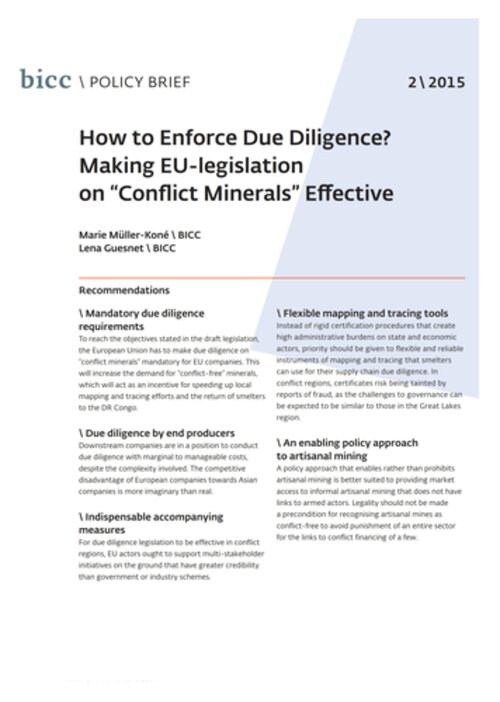Publications
How to enforce due diligence? Making EU-legislation on ‘Conflict Minerals’ effective
Release Date
2015-04
Language
- English
Topics
- –
In the weeks and months ahead, the European parliament has a decisive role in reaching meaningful European legislation on the responsible sourcing of minerals from conflict regions. In mid- May 2015, it is due to vote on an EU regulation drafted by the European Commission. In BICC Policy Brief 2\2015 Marie Müller-Koné and Lena Guesnet give policy recommendations to enhance this process.
The authors in particular recommend:
\ Mandatory due diligence requirements
To reach the objectives stated in the draft legislation, the EU has to make the requirements for EU companies to conduct due diligence on “conflict minerals” mandatory. This will increase the demand for “conflict-free” minerals, which will act as an incentive for local mapping and tracing efforts to speed up and smelters to return to the DR Congo.\ Due diligence by end-producers
Downstream companies are in a position to conduct due diligence with marginal to manageable costs, despite the complexity involved. The competitive disadvantage of European companies towards Asian companies is more assumed than real.
\ Indispensable “accompanying measures”
For due diligence measures to be effective in the Great Lakes Region, as in other potential conflict-affected and high-risk areas, EU actors should support multi-stakeholder initiatives on the ground, which have greater credibility than government or industry schemes.
\ Flexible mapping and tracing tools
The aim should be flexible and reliable instruments of mapping and tracing that smelters can use for their supply chain due diligence, rather than rigid certification procedures which create high administrative burdens on state and economic actors. In conflict-affected and high-risk areas, certificates risk being tainted by reports of fraud, as the governance challenges can be expected to be similar as in the Great Lakes region.
\ An enabling policy approach to artisanal mining
An enabling instead of a prohibiting policy approach is better able to provide market access to informal artisanal mining, which does not have links to armed groups or the military. Legality should not be made a precondition for artisanal mines to being recognized as “conflict-free” in order to avoid punishing a whole sector for the links to conflict financing of a few.
PDF-Download

Cite as
Document-Type
BICC Policy brief
Publisher
BICC
Place
Bonn
Countries/Region
Congo, Democratic Republic of the



